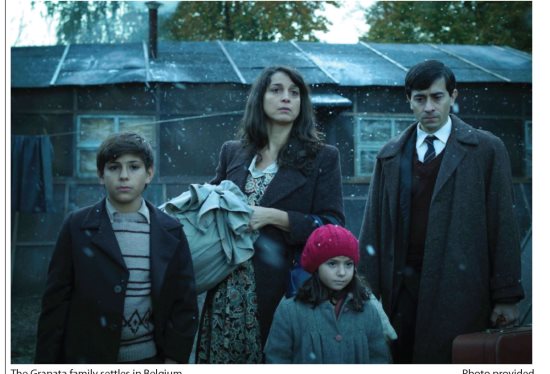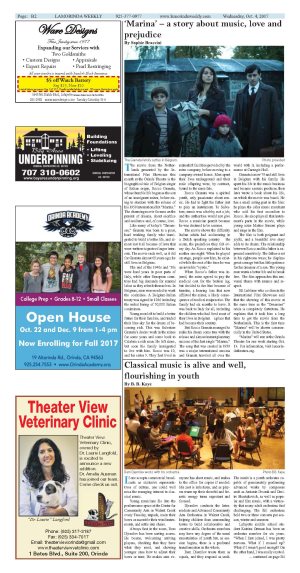| | Published October 4th, 2017
| 'Marina' - a story about music, love and prejudice
| | | By Sophie Braccini |  | | The Granata family settles in Belgium. Photo provided |
The movie from the Netherlands presented by the International Film Showcase this month at the Orinda Theatre is the biographical tale of Belgian singer of Italian origin, Rocco Granata, whose humble life began as the son of an immigrant miner, before rising to stardom with the release of his 1959 international hit "Marina." The charming movie focuses on the pursuit of dreams, about sacrifice and resilience and, of course, love.
 Like many of today's "Dreamers," Granata was born to a poor, hard working family who immigrated to build a better life, and almost lost it all because of laws that were written to protect larger interests. The movie ends well, as it did for Granata almost 60 years ago; he still lives in Belgium.
Like many of today's "Dreamers," Granata was born to a poor, hard working family who immigrated to build a better life, and almost lost it all because of laws that were written to protect larger interests. The movie ends well, as it did for Granata almost 60 years ago; he still lives in Belgium.
 The end of the 1940s and '50s were hard years in poor parts of Italy, while other European countries had big demands for manual labor as they rebuilt themselves. In Belgium, men were needed to work the coalmines. A Belgium-Italian treaty was signed in 1946 including the initial hiring of 50,000 Italian coalminers.
The end of the 1940s and '50s were hard years in poor parts of Italy, while other European countries had big demands for manual labor as they rebuilt themselves. In Belgium, men were needed to work the coalmines. A Belgium-Italian treaty was signed in 1946 including the initial hiring of 50,000 Italian coalminers.
 Young men left to build a better future for their families, and traded their blue sky for the dream of becoming rich. This was Salvatore Granata's desire: work in the mines for some years and come back to Calabria a rich man. He left alone, but soon his family immigrated to live with him. Rocco was 10, and his sister 5. They first lived in makeshift facilities provided by the mine company, before moving to a company-owned home. Men spent their lives underground and their male offspring were, by contract, bound to the same fate.
Young men left to build a better future for their families, and traded their blue sky for the dream of becoming rich. This was Salvatore Granata's desire: work in the mines for some years and come back to Calabria a rich man. He left alone, but soon his family immigrated to live with him. Rocco was 10, and his sister 5. They first lived in makeshift facilities provided by the mine company, before moving to a company-owned home. Men spent their lives underground and their male offspring were, by contract, bound to the same fate.
 Rocco Granata was a spirited youth, only passionate about music. He had to fight his father just to play an instrument. To Salvatore, music was a hobby, not a job, and the authorities would not give Rocco a musician permit because he was destined to be a miner.
Rocco Granata was a spirited youth, only passionate about music. He had to fight his father just to play an instrument. To Salvatore, music was a hobby, not a job, and the authorities would not give Rocco a musician permit because he was destined to be a miner.
 The movie shows the difficulty Italian adults had acclimating in a Dutch speaking country - the scorn, the prejudices they felt every day. As Rocco explained to his mother one night: When he played on stage, people saw him, he existed while the rest of the time he was an invisible "eyetie."
The movie shows the difficulty Italian adults had acclimating in a Dutch speaking country - the scorn, the prejudices they felt every day. As Rocco explained to his mother one night: When he played on stage, people saw him, he existed while the rest of the time he was an invisible "eyetie."
 When Rocco's father was injured, the mine agreed to pay the medical cost for the broken leg, but decided to fire him because of tinnitus, a hearing loss that now afflicted the miner, a likely consequence of medical malpractice. The family had six months to leave. It was back to Italy for all, including the children who had lived most of their lives in Belgium - a place that had become their country.
When Rocco's father was injured, the mine agreed to pay the medical cost for the broken leg, but decided to fire him because of tinnitus, a hearing loss that now afflicted the miner, a likely consequence of medical malpractice. The family had six months to leave. It was back to Italy for all, including the children who had lived most of their lives in Belgium - a place that had become their country.
 But Rocco Granata managed to make his dream come true with the release and almost instant planetary success of his first single "Marina." The song that was created in 1959 was a major international success and Granata traveled all over the world with it, including a performance at Carnegie Hall.
But Rocco Granata managed to make his dream come true with the release and almost instant planetary success of his first single "Marina." The song that was created in 1959 was a major international success and Granata traveled all over the world with it, including a performance at Carnegie Hall.
 Granata is now 79 and still lives in Belgium with his family. He spent his life in the music business and became a music producer, then later wrote a book about his life, on which the movie was based. He has a small acting part in the film: he plays the older music merchant who sold his first accordion to Rocco. He also plays all that instrument's parts in the movie, while young actor Matteo Simoni plays and sings in the film.
Granata is now 79 and still lives in Belgium with his family. He spent his life in the music business and became a music producer, then later wrote a book about his life, on which the movie was based. He has a small acting part in the film: he plays the older music merchant who sold his first accordion to Rocco. He also plays all that instrument's parts in the movie, while young actor Matteo Simoni plays and sings in the film.
 The film is both poignant and joyful, and a beautiful love story adds to its charm. The relationship between Rocco and his father is expressed sensitively. The father is set in his righteous ways; he displays great courage but has little patience for his dreamer of a son. The young man wants a better life and to break free. The film approaches this universal theme with nuance and respect.
The film is both poignant and joyful, and a beautiful love story adds to its charm. The relationship between Rocco and his father is expressed sensitively. The father is set in his righteous ways; he displays great courage but has little patience for his dreamer of a son. The young man wants a better life and to break free. The film approaches this universal theme with nuance and respect.
 Efi Lubliner who co-directs the International Film Showcase said that the showing of this movie at the same time as the "Dreamers" crisis is completely fortuitous. He explains that it took him a long time to get the movie from the Netherlands. This is the first time "Marina" will be shown commercially in the United States.
Efi Lubliner who co-directs the International Film Showcase said that the showing of this movie at the same time as the "Dreamers" crisis is completely fortuitous. He explains that it took him a long time to get the movie from the Netherlands. This is the first time "Marina" will be shown commercially in the United States.
 "Marina" will run at the Orinda Theatre for one week starting Oct. 13. For information, visit www.lamorindatheatres.org.
"Marina" will run at the Orinda Theatre for one week starting Oct. 13. For information, visit www.lamorindatheatres.org.


|
| | | | | | | | | | | | |



